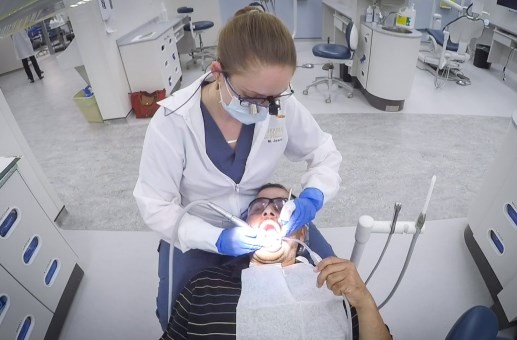By Aya Al-Hakim, CBC News, 29 September 29, 2017.
Khaled Al-Hilal can’t remember the last time he had his teeth checked by a dentist before he came to Canada in 2016.
The Syrian refugee had been living in camps in Lebanon after fleeing civil war in his home country, and what money he had was spent on basic necessities, like food and water. He could hardly afford a dentist.
But in Halifax, where he’s now settled, he’s become a patient at the Immigrant Oral Health Outreach Clinic, which is run by Dalhousie University’s faculty of dentistry.

“We never expected to receive such care for our teeth in the way we see here,” he said.
Earlier this month, the free clinic got a $250,000 financial boost from Green Shield Canada, a company that works to improve access to health care for uninsured or underinsured Canadians.
The money will help expand the clinic’s oral health-care services for refugees and immigrants, and it’s anticipated 120 patients will be treated this year.
Dental hygiene professor Heather Doucette began the clinic five years ago with the hope that students would gain experience treating under-served populations, and to help immigrants receive much needed care.
She collaborated with the Immigrant Services Association of Nova Scotia to bring clients into the clinic, where dental hygiene students would provide preventive treatments, such as teeth cleanings.
“We had no funding at that point, so we were never able to extend that care further than dental hygiene treatment,” Doucette said. “So, if clients had fillings that they needed or extractions or some simple dental work to be done, we couldn’t provide that.”
High rates of tooth decay
The new funding means services will be expanded and for the first time dentistry students will be working at the clinic, gaining experience with non-English speaking patients.
The federal government’s health program for refugees provides limited and temporary dental care. For example, it covers basic procedures such as extractions, but not root canals.
According to a report done by researchers at Dalhousie University, oral disease among the refugee and immigrant population in Nova Scotia is higher than the Canadian average. Over half of immigrants and 85 per cent of refugees had untreated decay, compared to 20 per cent of Canadian adults.
“There are many reasons why refugees have higher rates of oral disease,” said Doucette. “It could be the prior living conditions or it could also be just knowledge surrounding oral health is different from one culture to another.”

Some of the common languages spoken by patients at the clinic are Arabic, Farsi and Swahili and the clinic has brought in as many interpreters as it can. Interpreters help explain treatment options and what the students are doing to the patients.
“It is kind of hard to try to interact without knowing the same language,” said Melissa Jeans, a fourth-year dentistry student. “But I feel like we did a pretty good job with the translators that are here.”
The recent funding will also help the clinic provide educational written materials translated into several different languages to help educate patients about oral health.
Doucette said the money allows the clinic to be open three days a month, up from two. She also hopes the program will give students the necessary skills to overcome any language or cultural barriers they may have with their patients.
“I hope that this will give students a sense of giving back to the community so that once they graduate they’ll continue to provide care for people who don’t have access to care,” she said.
